人教新目标版英语七年级上Unit 3 Is this your pencil?词汇辨析课件(44张PPT无素材)
文档属性
| 名称 | 人教新目标版英语七年级上Unit 3 Is this your pencil?词汇辨析课件(44张PPT无素材) |  | |
| 格式 | zip | ||
| 文件大小 | 11.0MB | ||
| 资源类型 | 教案 | ||
| 版本资源 | 人教新目标(Go for it)版 | ||
| 科目 | 英语 | ||
| 更新时间 | 2021-08-17 00:29:47 | ||
图片预览

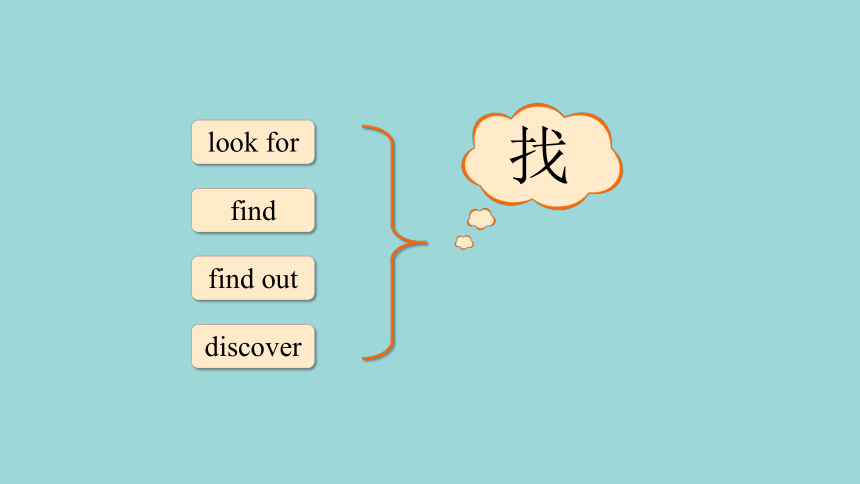
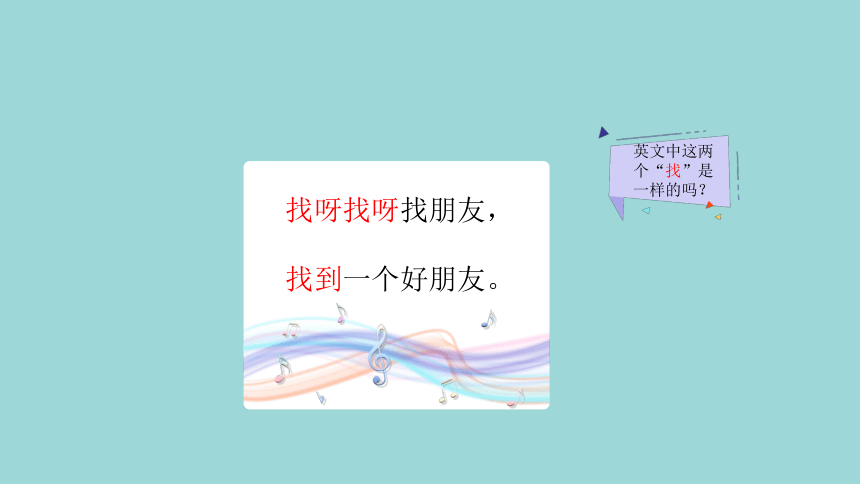
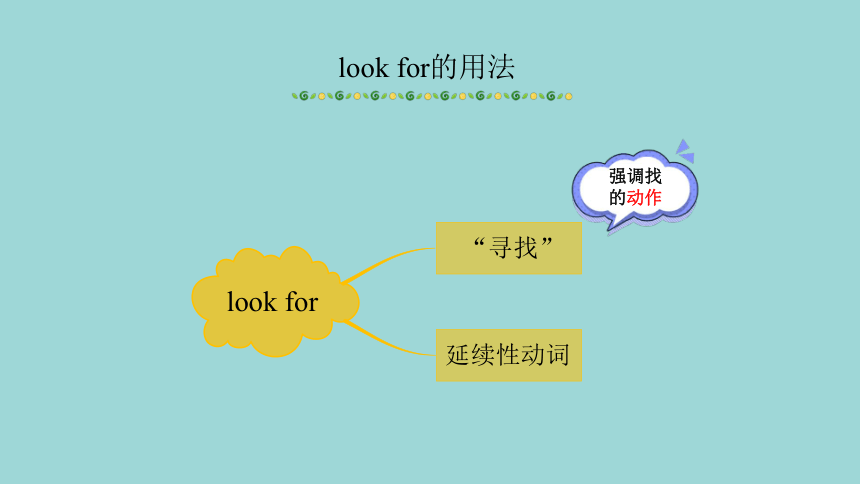
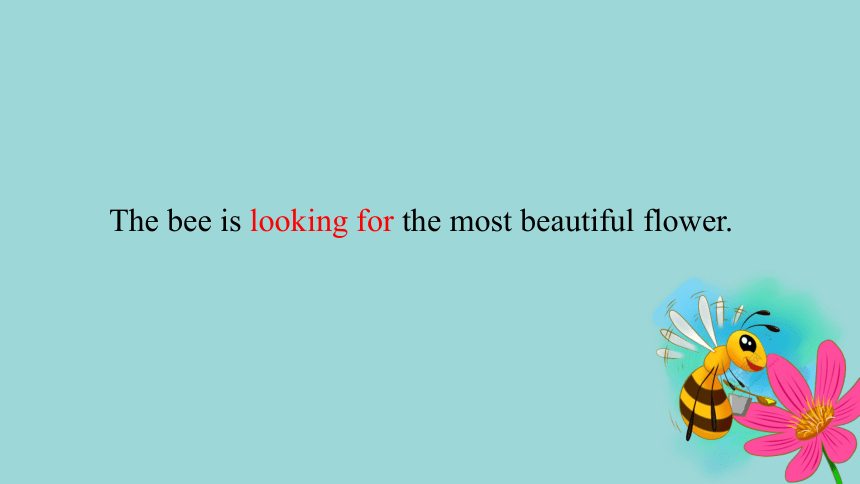
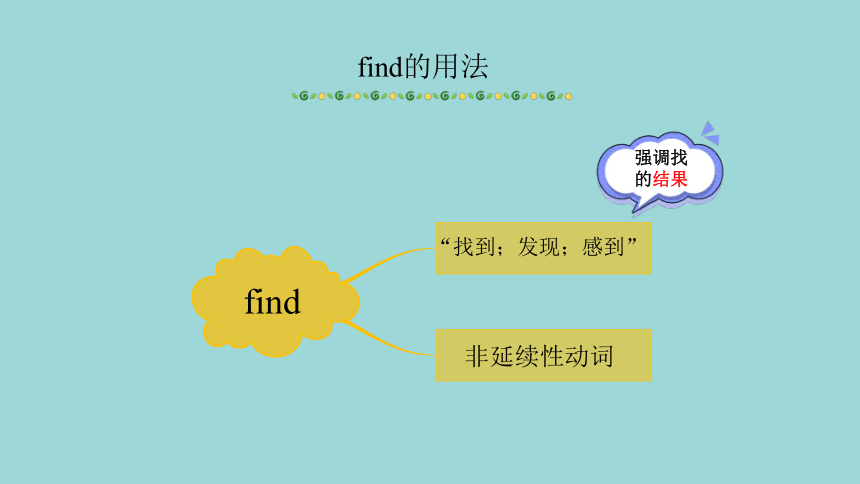

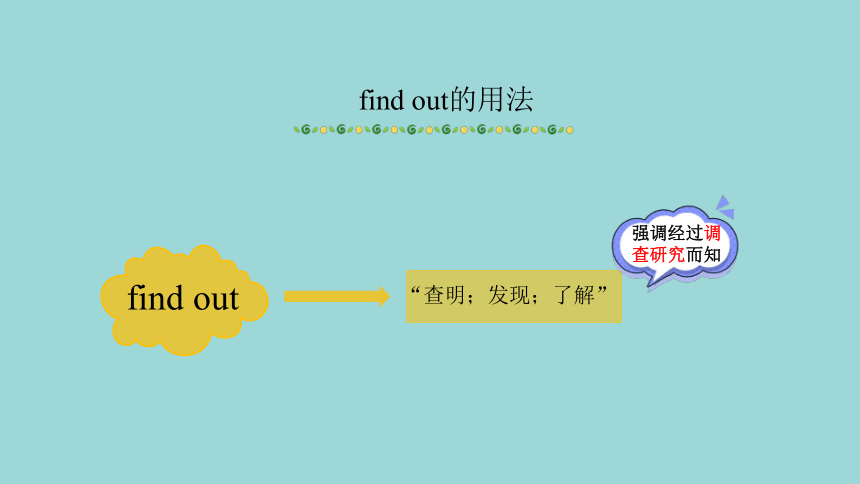
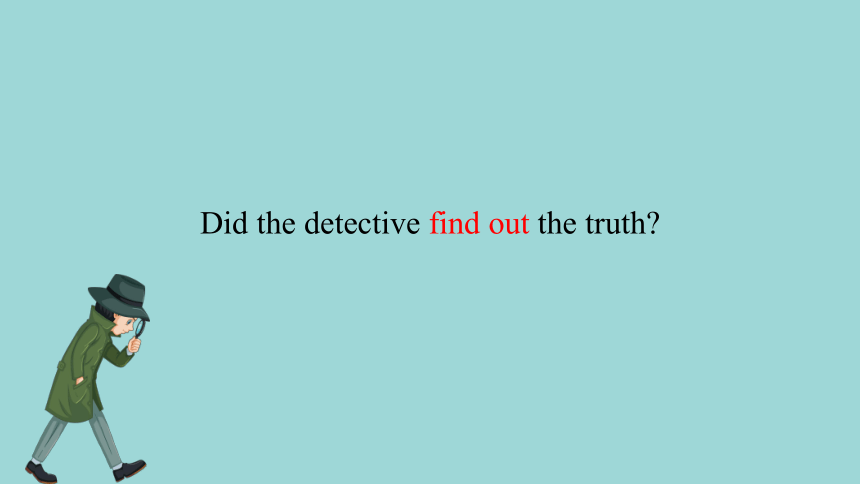
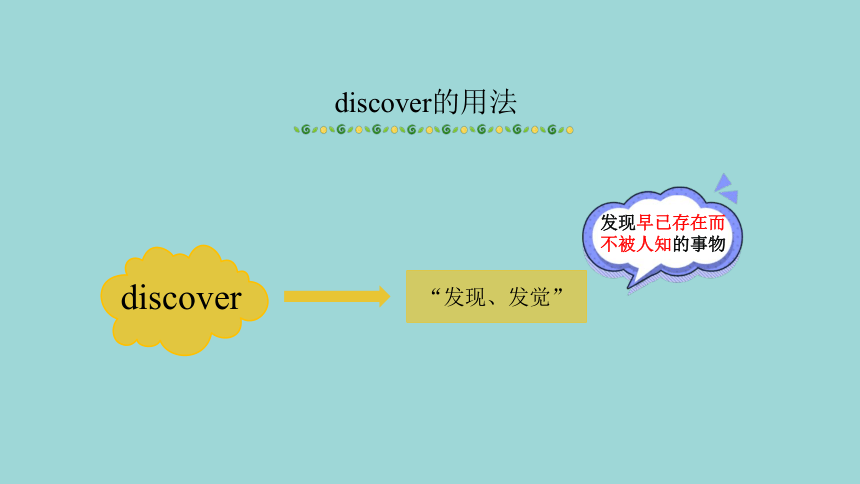

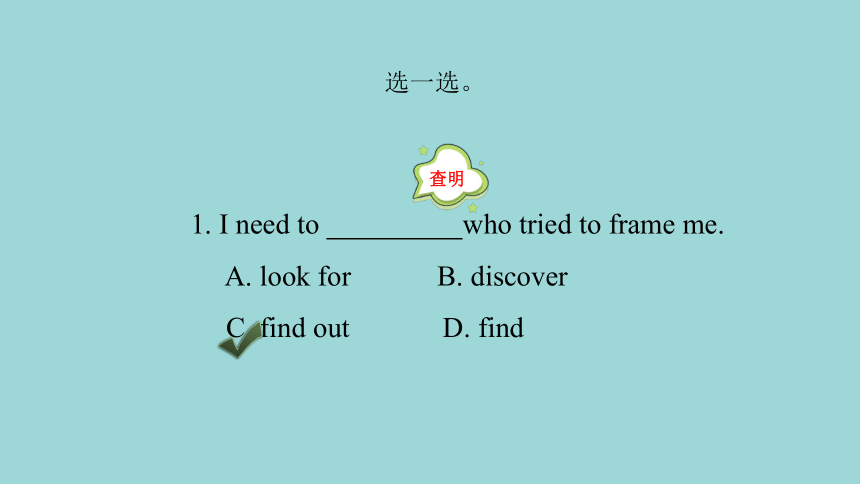
文档简介
(共44张PPT)
词汇辨析
look
for,
find,
find
out,
discover
look
for
find
find
out
discover
找
找呀找呀找朋友,
找到一个好朋友。
英文中这两个“找”是一样的吗?
look
for
“寻找”
延续性动词
look
for的用法
强调找的动作
The
bee
is
looking
for
the
most
beautiful
flower.
find
“找到;发现;感到”
非延续性动词
find的用法
强调找的结果
Finally,
he
found
a
good
job
after
one
year.
“查明;发现;了解”
find
out的用法
强调经过调查研究而知
find
out
Did
the
detective
find
out
the
truth?
“发现、发觉”
discover的用法
发现早已存在而不被人知的事物
discover
The
Chinese
discovered
coal.
选一选。
1.
I
need
to
who
tried
to
frame
me.
A.
look
for
B.
discover
C.
find
out
D.
find
查明
2.
I
woke
up
to
that
he
had
gone.
A.
look
for
B.
discover
C.
find
out
D.
find
选一选。
发觉
3.
The
searchers
are
the
missing
boy.
A.
looking
for
B.
discovering
C.
finding
out
D.
finding
选一选。
强调动作
look
for
find
find
out
discover
找的动作
找的结果
经过调查研究后得出结果
发现早已存在而不被人知的事物
Summary
词汇辨析
look,
see,
watch与read
look
see
watch
read
看
你在“看”什么
look
集中注意力
地看
强调看的
动作
引起对方
注意
+at
接宾语
look的用法
单独使用
Look!
Tom
is
over
there.
He
is
looking
at
a
bird.
see
强调看到的结果
看到,看见
see的用法
I
can
see
some
trees
in
the
picture.
专注地看
watch的用法
watch
看电视、看球赛
欣赏
They
are
watching
TV
in
the
living
room.
阅读
read的用法
read
看书、看报
Do
you
like
to
read
books?
选一选。
1.
Li
Lei
likes
football
very
much.
He
often
______
football
games.
A.
look
B.
see
C.
watch
D.
read
2.
Kangkang
is
____
a
book
in
the
library.
A.
looking
B.
seeing
C.
watching
D.
reading
选一选。
look
see
watch
read
看的动作
看的结果
看电视/比赛
看书/报纸
Summary
词汇辨析
must和have
to
must
have
to
必须
动词原形
Her
child
is
too
young.
She
______
look
after
him.
必须
主观
需要
“必须”
客观必
要性
“不得不”
必须
must
have
to
must和have
to的区别
1
I
must
do
my
homework
first.
I
have
to
do
my
homework
first.
主观愿望
客观必要性
must和have
to的区别
必须
must
have
to
2
情态
动词
无时态和人称变化
有时态和人称变化
She
must
clean
the
room
now.
She
has
to
clean
the
room
now.
must和have
to的区别
必须
must
have
to
3
否定
mustn’t
don’t
have
to
否定
禁止
不必要
You
mustn't
swim
here.
You
don't
have
to
attend
the
meeting.
禁止
不必要
needn’t
don’t
have
to
肯定
must
Tips
一般疑问句
否定
must
Must
I
hand
in
before
five?
No,
you
needn’t/don't
have
to.
Yes,
you
must.
选一选。
1.
—Must
I
do
it
now?
—No,
you
______.
A.
shouldn't
B.
don't
have
to
C.
mustn't
D.
can't
2.
Mum
is
out,
so
I
_____
look
after
the
shop.
A.
must
B.
may
C.
have
to
D.
might
选一选。
主观意愿
mustn't
表禁止
无时态人称变化
客观需要
有时态人称变化
have
to
don’t
have
to不必要
must
必须
Summary
Bye-bye
词汇辨析
look
for,
find,
find
out,
discover
look
for
find
find
out
discover
找
找呀找呀找朋友,
找到一个好朋友。
英文中这两个“找”是一样的吗?
look
for
“寻找”
延续性动词
look
for的用法
强调找的动作
The
bee
is
looking
for
the
most
beautiful
flower.
find
“找到;发现;感到”
非延续性动词
find的用法
强调找的结果
Finally,
he
found
a
good
job
after
one
year.
“查明;发现;了解”
find
out的用法
强调经过调查研究而知
find
out
Did
the
detective
find
out
the
truth?
“发现、发觉”
discover的用法
发现早已存在而不被人知的事物
discover
The
Chinese
discovered
coal.
选一选。
1.
I
need
to
who
tried
to
frame
me.
A.
look
for
B.
discover
C.
find
out
D.
find
查明
2.
I
woke
up
to
that
he
had
gone.
A.
look
for
B.
discover
C.
find
out
D.
find
选一选。
发觉
3.
The
searchers
are
the
missing
boy.
A.
looking
for
B.
discovering
C.
finding
out
D.
finding
选一选。
强调动作
look
for
find
find
out
discover
找的动作
找的结果
经过调查研究后得出结果
发现早已存在而不被人知的事物
Summary
词汇辨析
look,
see,
watch与read
look
see
watch
read
看
你在“看”什么
look
集中注意力
地看
强调看的
动作
引起对方
注意
+at
接宾语
look的用法
单独使用
Look!
Tom
is
over
there.
He
is
looking
at
a
bird.
see
强调看到的结果
看到,看见
see的用法
I
can
see
some
trees
in
the
picture.
专注地看
watch的用法
watch
看电视、看球赛
欣赏
They
are
watching
TV
in
the
living
room.
阅读
read的用法
read
看书、看报
Do
you
like
to
read
books?
选一选。
1.
Li
Lei
likes
football
very
much.
He
often
______
football
games.
A.
look
B.
see
C.
watch
D.
read
2.
Kangkang
is
____
a
book
in
the
library.
A.
looking
B.
seeing
C.
watching
D.
reading
选一选。
look
see
watch
read
看的动作
看的结果
看电视/比赛
看书/报纸
Summary
词汇辨析
must和have
to
must
have
to
必须
动词原形
Her
child
is
too
young.
She
______
look
after
him.
必须
主观
需要
“必须”
客观必
要性
“不得不”
必须
must
have
to
must和have
to的区别
1
I
must
do
my
homework
first.
I
have
to
do
my
homework
first.
主观愿望
客观必要性
must和have
to的区别
必须
must
have
to
2
情态
动词
无时态和人称变化
有时态和人称变化
She
must
clean
the
room
now.
She
has
to
clean
the
room
now.
must和have
to的区别
必须
must
have
to
3
否定
mustn’t
don’t
have
to
否定
禁止
不必要
You
mustn't
swim
here.
You
don't
have
to
attend
the
meeting.
禁止
不必要
needn’t
don’t
have
to
肯定
must
Tips
一般疑问句
否定
must
Must
I
hand
in
before
five?
No,
you
needn’t/don't
have
to.
Yes,
you
must.
选一选。
1.
—Must
I
do
it
now?
—No,
you
______.
A.
shouldn't
B.
don't
have
to
C.
mustn't
D.
can't
2.
Mum
is
out,
so
I
_____
look
after
the
shop.
A.
must
B.
may
C.
have
to
D.
might
选一选。
主观意愿
mustn't
表禁止
无时态人称变化
客观需要
有时态人称变化
have
to
don’t
have
to不必要
must
必须
Summary
Bye-bye
同课章节目录
- starters 预备篇(2012秋审查)
- Unit 1 Good morning !
- Unit 2 What’s this in English?
- Unit 3 What color is it ?
- Unit 1 My name's Gina.
- Section A
- Section B
- Unit 2 This is my sister.
- Section A
- Section B
- Unit 3 Is this your pencil?
- Section A
- Section B
- Unit 4 Where's my schoolbag?
- Section A
- Section B
- Unit 5 Do you have a soccer ball?
- Section A
- Section B
- Unit 6 Do you like bananas?
- Section A
- Section B
- Unit 7 How much are these socks?
- Section A
- Section B
- Unit 8 When is your birthday?
- Section A
- Section B
- Unit 9 My favorite subject is science.
- Section A
- Section B
